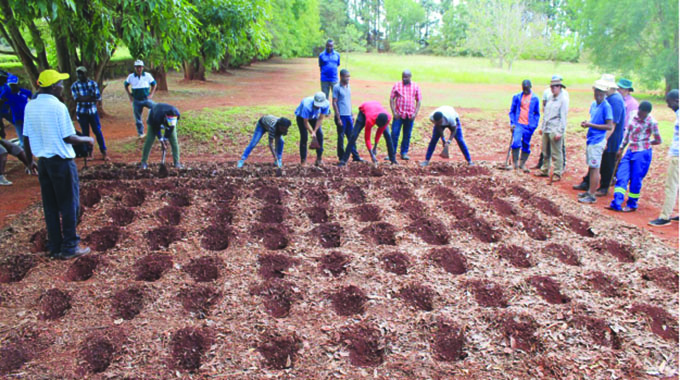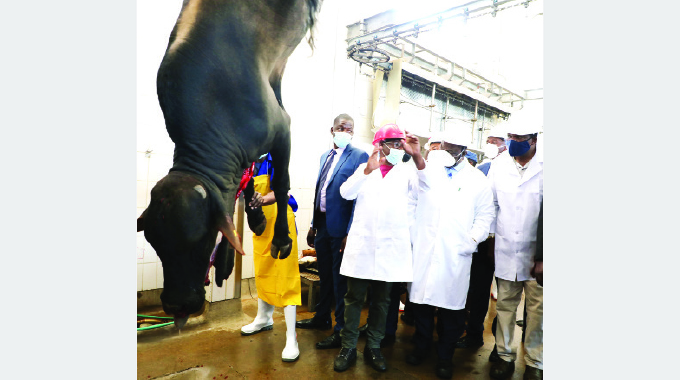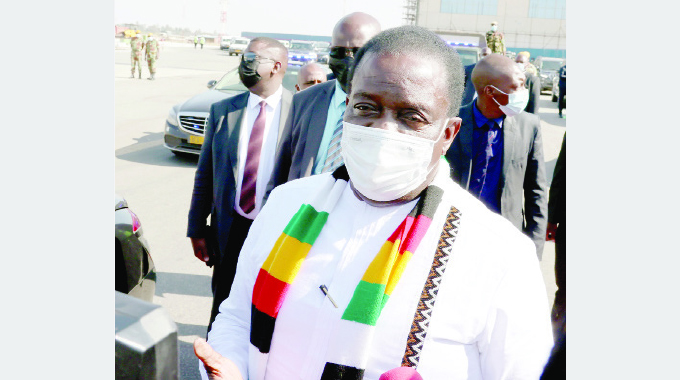Pfumvudza mechanisation to boost yields

Elita Chikwati-Acting Features Editor
Small-scale farmers will be accessing a lot more mechanisation as they boost hectarages and yields under the Pfumvudza/Intwasa programme with pilot projects already underway as Government continues to push forward with boosting food production and rural incomes.
Pfumvudza is a concept aimed at climate-proofing agriculture by adopting conservation farming techniques and involves the use of small areas and applying the correct agronomic practices for higher yields and so returns, rather than having large fields with low yields or zero yields if the crop fails.
The concept, which is mostly applied to maize, traditional grains and cotton is also meant to accelerate the commercialisation of smallholder agriculture.
Lands, Agriculture, Fisheries, Water and Rural Development chief director responsible for agricultural advisory service Professor Obert Jiri yesterday said mechanising Pfumvudza was going to make life easier for some farmers who do not have the capacity to do potholing manually, such as old people and child-headed families.
Pilot projects were underway and starting next year, farmers could have access to machinery for the Pfumvudza land preparations.
“We are working with universities, research institutions and farm equipment machinery so we can develop appropriate machinery for pot-holing. Currently we are carrying out pilot projects using two-wheeled tractors.
“We intend to mechanise Pfumvudza. The concept is about mitigating against climate change and conserving moisture.”
Prof Jiri said farmers were currently carrying out preparations and mulching for the next season. Inputs under the programme are only distributed to a particular household once Agritex have confirmed the potholing is complete and the required mulch, which is needed for moisture conservation but has other benefits, is physically next to the plots.
“We are emphasising on the importance of timing in farming. Training is underway and we are closely working with village heads and chiefs for demonstration sites where their subjects will also learn.
Last week 120 000 farmers countrywide had dug pot holes and cumulatively the number of farmers who have established plantings stations has increased to more than 500 000,” he said.
Prof Jiri said this season seed will be distributed according to agro ecological regions.
Those in the high-potential yield areas such as region 1 and 2 will receive more maize seed, about 10 kilogrammes, while those in low rainfall areas will receive more seed for traditional grains than maize seed since that will ensure they have a reasonable harvest regardless of how much rain falls and when it falls, so long as they follow the conservation tillage.
“Each extension officer has a map on the agro-ecological regions of his or her ward and also results for the soils tests. This will define how we will attend to the soil. Where the pH is low, we give lime,” he said.
Zimbabwe Commercial Farmers Union president Dr Shadreck Makombe said land preparations were going on well with some farmers already receiving lime and fertilisers.
“We welcome the initiative to mechanise Pfumvudza. This will help many people who cannot dig the planting holes,” he said.
Goromonzi farmer, Mrs Fortunate Maverengo said Pfumvudza was a good programme that gives high yields while using less fertiliser.
“The programme taught us to apply the correct amounts of fertilisers. We used to waste fertilisers but through training we are now aware of the right quantities. Farming then makes sense when we get high yields but using less inputs.
“Mechanising Pfumvudza is a good move especially for those with disabilities and the old. Some people have been shying away from Pfumvudza because of the digging of the holes. However once the holes are established the work becomes less labour intensive as one can always renew the holes every season,” she said.
Mrs Shelter Shambare of Mutimumwe Village in Chikwaka said she will not abandon Pfumvudza because she uses less money for inputs than when using the conventional method.
“With Pfumvudza, our soils are not disturbed as is the case when suing a tractor. I have been using the Pfumvudza method for the past three years and my yields continue increasing,” she said.
The Presidential Input Programme is targeting 3 million farmers up from last season’s 2,7 million in communal, A1, small scale commercial farming, old resettlement and peri-urban farming sectors for cereals, oilseeds and legumes.
The programme will support five Pfumvudza plots each of 39m x 16m per household with a agro-ecological regions specific crop input package for maize, sorghum, pearl millet, soya beans, sunflower, groundnuts, vegetables and African peas.
The package will also include water retention enhancers, herbicides package for three plots and a fall-armyworm control package.
The programme is also targeting 500 000 urban farmers who will get one plot each of maize and one bag of fertilisers will be shared among three beneficiaries.
Government has already released $20 billion towards the Pfumvudza/Intwasa programme to boost food security.
The 2022/23 summer programme’s strategic objective is to sustainably increase crop production and productivity to meet and surpass the national requirements for both human consumption and industrial use through the implementation of the key tenets of the Agriculture Recovery Plan.








Comments